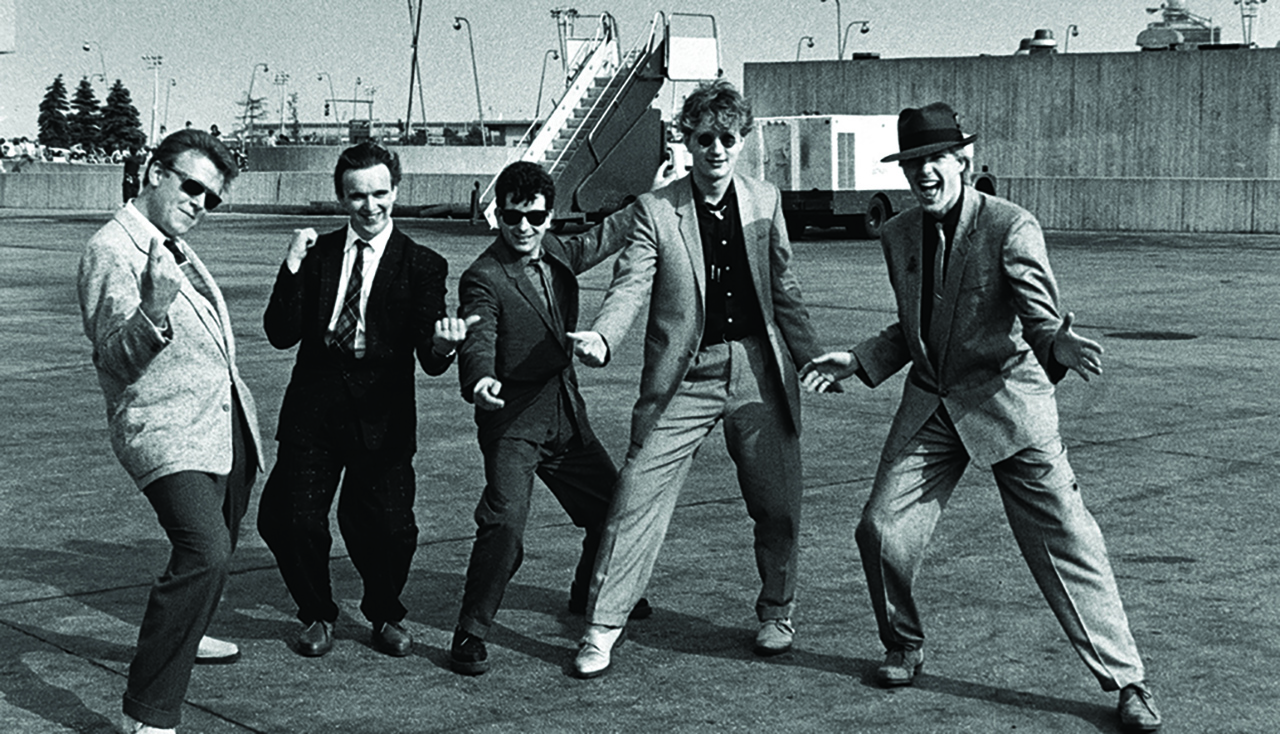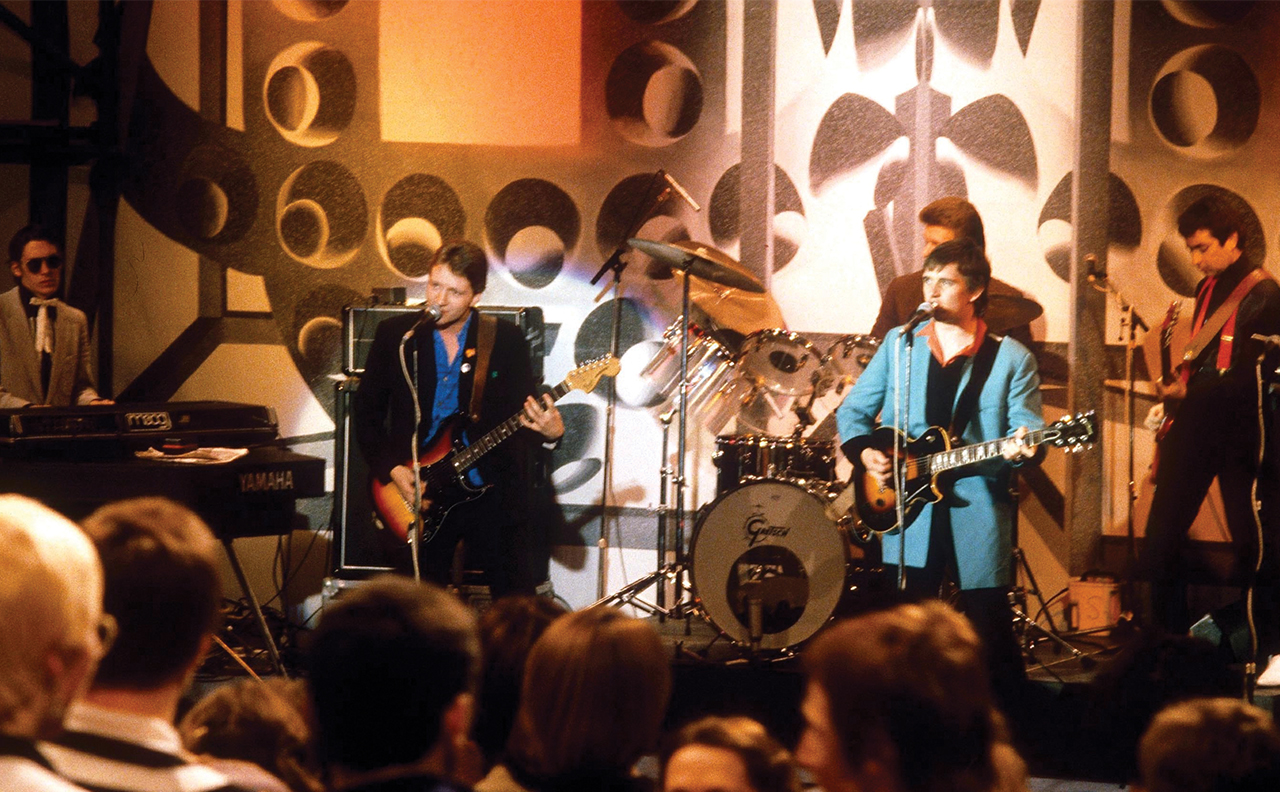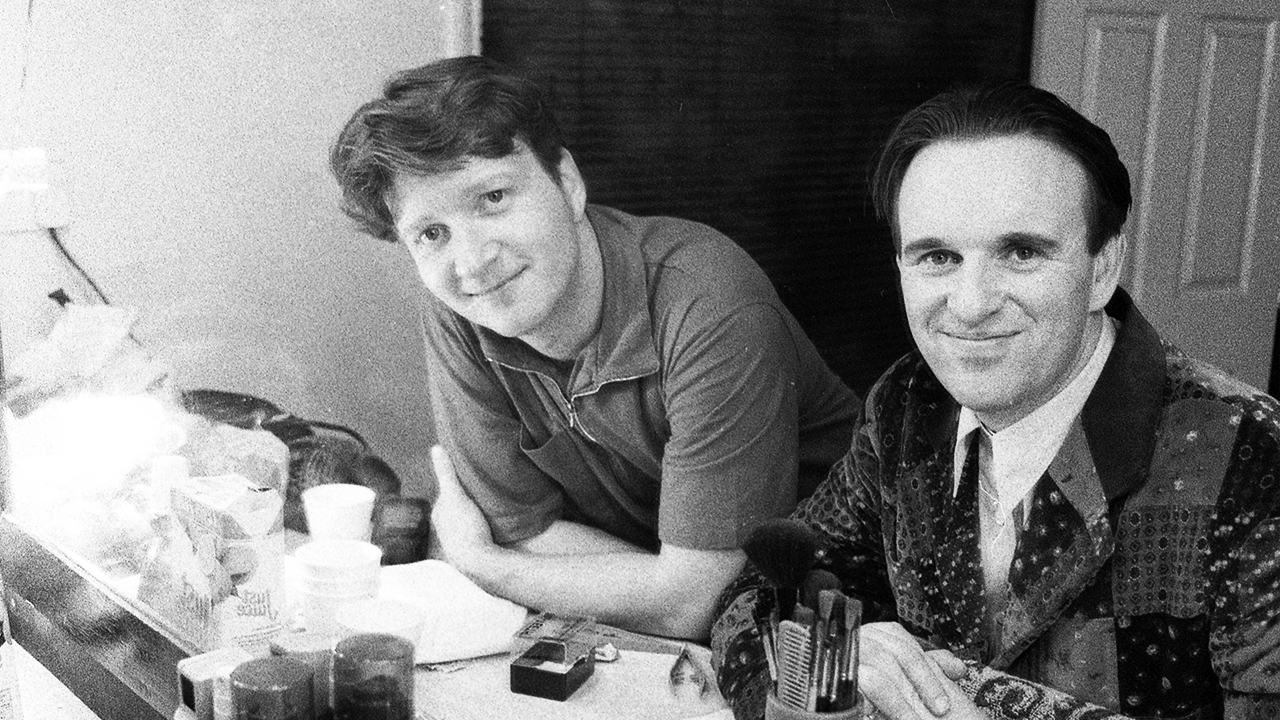The Likely Lads Of British Rock: Squeeze
From bittersweet songs about first love and wanking to lambasting the Prime Minister live on TV, Squeeze are the working-class band that cool cats still love.

It was a very Squeeze kind of political protest: warm and melodic, wry and witty, sunny on the surface but seething with rage beneath. Back in January, when Glenn Tilbrook realised his band had been booked to perform live in front of Prime Minister David Cameron on Andrew Marr’s BBC television show, the devil on the Squeeze man’s shoulder told him this was the perfect chance to launch a lyrical attack on Tory housing policy. A very British coup.
Later, when his anger subsided, Tilbrook shelved the idea as silly and unprofessional. But shortly before Squeeze were due to play, having seen Cameron speak about the bulldozing of council estates, he felt himself enraged again. Without warning the BBC or his fellow band members, he rewrote one verse of the song Cradle To The Grave, paying homage to his own council house background and lambasting politicians ‘hellbent on the destruction of the welfare state’. As he sang these words, he shot the PM a sly look.
“The great thing was I didn’t have a chance to be nervous, or make anybody else nervous,” Tilbrook recalls. “I didn’t tell anybody else. To be honest, I felt so angry that I just had to do it. I don’t think I’ll be confronted with that set of circumstances very often, which is also what made it so imperative to do it.”
Reaction in the BBC studio was polite. A few technicians and security men twigged what had happened, but not Cameron, who applauded the song heartily.
“It obviously went straight over his head,” says Chris Difford, Tilbrook’s long-time songwriting partner, with a grin, “because he came up to us afterwards and said: ‘Do you know what? I think that song’s going to be a hit…’ Ha!”
With a legacy spanning more than 40 years, Squeeze are one of the great London bands, their hit-packed history full of bittersweet confessionals about first love and teenage pregnancy, sex and infidelity, boozing and wanking. Raised on The Beatles, The Kinks and Jimi Hendrix, Difford and Tilbrook wrote their first songs in thrall to Bowie and Bolan, the Faces and the Velvet Underground. By the time Squeeze broke through in the late 1970s, their songwriting formula was perfect for new wave – punchy punk-rock energy mixed with sardonic lyrics and classic pop craftsmanship.
It’s February, a month after Squeeze’s headline-grabbing TV encounter with David Cameron, a pleasing reminder that these Britrock national treasures still have a dash of punky defiance behind their mellow divorced-dad tunes. The band’s studio headquarters is in Charlton, where Tilbrook grew up, close to the Thames and the O2 Arena. Difford was born in nearby Greenwich. Just down the road is Deptford, where Squeeze played their career-making early shows. This is the working-class South London heartland that runs through classic kitchen-sink mini-movie singles like Cool For Cats, Goodbye Girl and Up The Junction.
Sign up below to get the latest from Classic Rock, plus exclusive special offers, direct to your inbox!
From outside, Tilbrook’s 45 RPM studio looks like a plain single-storey office huddled on the edge of a shabby industrial estate. But inside it opens up into a psychedelic junk shop stuffed with rock memorabilia, vintage movie posters, showroom dummies, gold discs and souvenirs of a four-decade career.
Difford is here early, having travelled up from his family home on the Sussex coast. Squeeze’s principal lyricist since their foundation, the 61-year-old is the more reserved of the pair, with a deadpan manner and a dry wit. Tilbrook arrives late in a delighted fluster over his pet cockapoo’s newborn litter of six puppies. As the 58-year-old father-of-four explains, the emotional buzz is second only to having children.
With Difford and Tilbrook as sole remaining founder members, Squeeze are now deep into their third chapter, after four decades of hits and misses, depression and divorce, break-ups and breakdowns. Although the band have been active again since 2007, it took until last October for them to release their first album of new material in 17 years. Titled Cradle To The Grave, it’s a sumptuous collection of Beatlish music-hall flourishes, soulful midlife musings, and nostalgic namechecks for Bolan and Hendrix – vintage, velvet-lined Squeeze. But why the long wait?
“There’s no real answer, other than Glenn and I went in different directions,” says Difford. “We had solo careers, and all sorts of things that we needed to feel before finding ourselves again. It’s been a wonderful coming together. We’ve picked up where we first met really. We’re back in that songwriting flow.”

Cradle To The Grave was written as a semi-soundtrack to the BBC sitcom of the same name, which is based on NME writer-turned-broadcaster Danny Baker’s autobiographical memoir Going To Sea In A Sieve. Baker grew up in Bermondsey, sharing a similar working-class upbringing to Difford and Tilbrook. And the album ended up being more than just a soundtrack. Difford says the TV show was just “the ironing board to put the shirts on”, not the whole story. “We sat down with Danny and went through the scripts,” he recalls, “and then he said, ‘Ignore it – all we want is the best Squeeze album you can make.’”
Part of what makes Cradle To The Grave a vintage Squeeze album is its air of emotional authenticity. Difford’s conversational lyrics always feel like eavesdropping on real memories, real emotions, real lives. “Some of them are autobiographical, of course,” he nods, “in the same way that if you listen to a Ray Davies song, it all comes from him, from his journey. You can tell he has lived those songs. So some are from personal experience.”
Another very Squeeze touch is the droll humour sprinkled throughout. Bittersweet comic observation, puns and wordplay have long been Difford’s lyrical signatures.
“That’s just in my character I suppose,” he shrugs, “to be wry, dry, dark… and handsome. I admire other people lyrically: David Bowie, Elvis Costello, Morrissey. But I can’t wave a wand and be like them. I just have to be like me.”
Difford and Tilbrook are routinely likened to Lennon and McCartney. It’s a tempting but glib comparison. For one thing, their working method is much more clearly demarcated than The Beatles’. Difford has always been Squeeze’s main lyricist, while Tilbrook provides the music and most of the lead vocals.
In fairness, the Squeeze founders share a similar origin story to Lennon and McCartney. Both duos met as teenagers, sparking an instant songwriting chemistry. Both seem to have been the missing element that the other needed. “We’ve lasted longer, as people who have written together,” Tilbrook quips. “So in one way we’re ahead of them. Probably the only way.”
Before Squeeze, Tilbrook worked in various bars and hippie shops, and “lasted about three weeks” working with his father as a welder’s mate. But he was already playing occasional shows with piano player and future TV presenter Jools Holland, plus drummer Paul Gunn, both of whom would later join the first Squeeze line-up.
Difford, meanwhile, was forging an unlikely legal career as a trainee solicitor’s clerk. “But I didn’t last very long,” he says. “All the time I was writing lyrics down in little books, and my hair was getting longer. I remember getting removed from a marine court by the judge because my hair was too long.”
The duo’s first fateful meeting was in 1973, after Difford put a card in a sweet-shop window advertising for a guitarist who was into Hendrix, Lou Reed, The Kinks, The Beatles, Small Faces and Glenn Miller. Tilbrook was the only one to respond, lured by the fake promise of a record deal and tour. “The band didn’t exist,” Difford says with a grin. “I didn’t have any friends.”
By 1974, the fictitious band became real. Bringing in Holland and Gunn (the latter was soon replaced by Gilson Lavis on drums), plus Harry Kakoulli on bass, the embryonic Squeeze began building a reputation for explosive live shows on the vibrant South London rock scene. “There were very few who could touch us in those days,” Tilbrook says wistfully. “We were very tight musically, and we were exciting as well.”
Choosing their band name in tongue-in-cheek homage to the unloved Velvet Underground album that followed Lou Reed’s departure, Difford and Tilbrook hooked up with manager and label boss Miles Copeland, brother of Police drummer Stewart. With hindsight, the pair regret signing away half their early publishing royalties to him.
Even so, by 1976 Squeeze were “salivating” with delight at their first weekly wage as a professional band: a princely £15 per week. It was Copeland who brought in John Cale to produce Squeeze’s self-titled debut album in 1978, cementing the Velvet Underground connection. Cale was a hard taskmaster in the studio, ordering Difford and Tilbrook to shelve one batch of songs and write new material. But they still credit the veteran avant-rock icon with expanding their musical horizons.

“Some of the time I felt scared in his company, but looking back I’m glad that happened,” Difford says. “He picked up the boxful of toys, rattled them around and threw them all over the place. He made us stretch our imaginations and do things we wouldn’t normally have done.”
All the same, there was mutiny when Cale suggested naming the album Gay Guys. “I think he just likes to shake things up,” says Tilbrook. “He wasn’t ideally suited for the sort of songs we were writing, but what he brought to the table was amazing. He’s still one of the most talented people we’ve ever worked with.”
When they made their second album, Cool For Cats, in 1979, Squeeze had found their forte as a classic new-wave singles band. “Before new wave came along we really had no focus,” says Tilbrook. “We were all over the place musically. It was a great education for us.”
During this imperial phase, Squeeze produced Take Me I’m Yours, Goodbye Girl, Cool For Cats, Up The Junction, Another Nail In My Heart, Pulling Mussels (From The Shell), Labelled With Love and half a dozen more hits. They became bona fide, major-label pop stars. Difford was even recognised in his local baker’s shop. “Suddenly, when you ordered cheese on toast, it had an added thing to it,” he says. “It was celebrity cheese on toast.”
Squeeze’s glorious opening act peaked with their 1981 album East Side Story, which featured new keyboard player Paul Carrack, who replaced Jools Holland. Carrack also sang lead vocals on the band’s US breakthrough single, Tempted. The album was co-produced by Elvis Costello.
“We were all totally in love with Elvis and I think he loved us too,” says Tilbrook. “I have to say, before that we’d been working with John Wood, and he brought such a lot to the table for us also. John produced our second and third records. But Elvis was the first to lead us through the garden gate and into the big wide world.”
It couldn’t last, of course. The hits started to dry up, the booze flowed a little too freely and tensions flared within the band. Squeeze split for the first time in 1982, entering a long court battle with Copeland. But Difford and Tilbrook continued writing and recording as a duo, and even put together an early jukebox musical, Labelled With Love, based on their songs.
The duo christened a new line-up of Squeeze in 1985 with their Cosi Fanni Tutti Frutti album. Jools Holland briefly rejoined, as did his piano-playing younger brother Chris. Although their commercial profile was waning in Britain, the band began to enjoy belated US success with a string of high-charting singles there. “We gave it a good go,” says Tilbrook. “We got up to stadium size in some towns. Never the whole country, but enough that we still go there. If we play there now, we’re playing theatres.”
Squeeze’s growing US profile spawned their most bizarre and unlikely collaboration, a cover version of their semi-rap number The Amazoon by hip-hop legend Grandmaster Flash. “We got as far as doing a track for it at Sugarhill Records, which was fantastic,” Tilbrook recalls. “We used the Tower Of Power horn section, an amazing band.” Sadly, Flash left Sugarhill and the project was lost in litigation.
Although they never had a Zeppelin-sized reputation as boozy, druggy party animals, Squeeze hit their hedonistic peak in the 1980s. The excesses of the era eventually began to take their toll, especially on Difford. “When I see old footage of us in the eighties, I don’t see myself being in the band at all,” he says. “I feel disassociated… Which must have been fun, I guess.”
Finally accepting he had a drink problem, Difford checked himself into rehab in the early 1990s. “I haven’t had a drink for twenty-four-and-a-bit years,” he says today. “It often crosses my path, particularly when you go out to dinner and you see people have a nice glass of wine and you think: ‘That would be amazing.’ But I don’t know where it would lead to. I can’t trust myself. I just have to keep that in check on a daily basis.”
Difford credits kicking alcohol as a crucial turning point in his life. But his trials were far from over. In early 1999, he quit Squeeze dramatically at the start of a tour, leaving the band to implode just months later. Another spell in rehab followed.

“The second time I went in, I was just confused, I think,” he says. “I was in a relationship I hadn’t really valued properly. It was a very different thing. It wasn’t alcohol-related, it was depression, really. There are always other factors.”
With Squeeze on enforced sabbatical, Difford and Tilbrook barely spoke to each other for almost a decade. Shunning offers to re-form the band, they concentrated on their solo careers. Tilbrook remembers this frosty period as the worst falling-out between the two in more than 40 years. “But that was also a blessing,” Tilbrook says, “because we really had a chance to go off and do other things. Speaking for myself, being with someone since I was fifteen, I didn’t have a chance to know anything about myself. I’ve always been very insular in the way I work, so discovering what I could do by myself was a really vital thing for me to bring back to the table when we worked together again.”
A quarter-century after kicking booze, Difford insists alcohol is no longer an issue. “I’m really fortunate because I’m around people who don’t drink in excess,” he says. “Times have changed socially, too, I think. It’s very rare nowadays that I come across people being aggressively drunk. Even when I was drinking I wanted to be on my own. That was the worst thing, to be with other people. Because it meant there was less for me.”
Whatever happened to the Likely Lads of kitchen-sink cockney romance? They’re still together, amazingly, after all these years. And still writing sad, funny, warm-hearted songs about first love and wanking.
But the current Squeeze line-up is a very different animal to the band of boozy brothers that burst out of South London 40 years ago. Difford and Tilbrook now run an autonomous operation, with their own studio and record label. Their working methods have also evolved. Where Difford used to provide Tilbrook with stacks of lyrics for him to take away and set to music, the pair now spend much more time trading musical and lyrical ideas in the studio.
Galvanised by this new approach, they’re already planning a follow-up to Cradle To The Grave. “We will be writing and recording a new album,” Difford confirms. “But it doesn’t have to be done by next Monday. There’s no record company breathing down our backs.”
For all Squeeze’s rich history, Tilbrook rarely feels nostalgic for the old days. “I don’t spend a lot of time looking back,” he says. “We had some fantastic times, all through our career, and some not so good times too. But I’m really keen on where we are now. We have a wonderful space where we can explore and experiment, and that’s exactly what a band like us should do. I wouldn’t want to make Cradle To The Grave 2, we need to go somewhere else now.”
Does Tilbrook ever ponder the different path his life might have taken if he hadn’t answered Difford’s advert?
“I’m sure I would have been on the space shuttle by now,” he says with a laugh. “Who knows what would have happened? But I’m really pleased with what did happen. I definitely think that if I hadn’t met Chris, I wouldn’t have written such entertaining songs. They might have been musically great, but lyrically, I wouldn’t have had a clue.”
After a few wobbles over the decades, Difford and Tilbrook both seem very protective towards their long-lasting bond of friendship. As in all good marriages, they have also learned the value of giving each other space. Both now have grown‑up children, separate family lives, solo careers and side projects.
Squeeze’s plans for the year ahead include a packed summer of festival dates. After that, Tilbrook embarks on an extensive nationwide solo tour in the autumn. Difford, meanwhile, hosts regular songwriting workshops and is mentoring the rising young Irish band The Strypes for Elton John’s management company, Rocket – who also co-manage Squeeze, in partnership with Tilbrook’s wife Suzanne. Squeeze’s chief lyricist has also just completed his autobiography, provisionally titled I Never Thought It Would Happen. He later revised the text because his publisher demanded more bitchy backstabbing.
“My editor wants me to put in more slanderous stuff about people,” he says with mild exasperation. “He says I’m too kind. But I’m not that kind of bloke. He really wound me up with that, so the last chapter is called Fuck Off. It’s basically me saying that to everybody who I didn’t like working with. I did it as a joke, but he thinks it’s great.”
Strangely, writing the book has finally taught Difford something that most Squeeze fans already know. “It’s kind of odd, having written about my life, to discover the principal characters in it are me and Glenn,” he says. “There’s my mum and dad, my brothers, wives, children. But the principal characters are me and Glenn. I don’t know why I’m surprised, but it took me to write the book to realised that I’ll be defined beyond my years by our relationship.”
Difford pauses, weighing up the four-decade friendship at the heart of Squeeze. “One of us will be at the other’s funeral,” he says ruefully. “That is deep stuff.”
Stephen Dalton has been writing about all things rock for more than 30 years, starting in the late Eighties at the New Musical Express (RIP) when it was still an annoyingly pompous analogue weekly paper printed on dead trees and sold in actual physical shops. For the last decade or so he has been a regular contributor to Classic Rock magazine. He has also written about music and film for Uncut, Vox, Prog, The Quietus, Electronic Sound, Rolling Stone, The Times, The London Evening Standard, Wallpaper, The Film Verdict, Sight and Sound, The Hollywood Reporter and others, including some even more disreputable publications.

